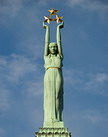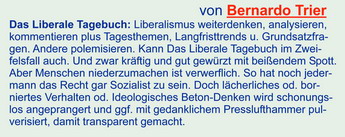|
Stand: 5. November 2002
Rede von Tony Blair auf dem Parteitag der SPD am 20.11.01
diese Rede war monatelang auf dem Server der Britischen Botschaft abrufbar; den Text gibt es derzeit auch nicht in der Redensammlung des Britischen Regie- rungschefs. Hier also der Wortlauf im Original:
It is a great privilege to be the first British Prime Minister ever to address an SPD Congress. And a particular privilege to share this platform with Gerhard.
No one takes
on the challenge of political leadership because they expect it to be easy. But I give you my honest opinion. Gerhard is leading Germany where Germany needs to go.
I believe only a leader of his post-war
generation, and only a person of his courage and integrity, could enable Germany at this time to accept her full responsibilities in the international community of nations.
No British Prime Minister and German
Chancellor can have had a closer or warmer relationship than we do. And I look forward to many years ahead, after your elections next autumn, when I am confident it will grow closer still.
And the same is true of
our parties. For the fundamental values that inspired and those who founded the SPD and the Labour Party are more relevant, not less, in this increasingly interdependent world.
I am a social democrat and proud of
it. Of course I am also a modernizer. Social democracy itself was an idea born out of the need to modernize. We need constantly to look for ways of updating how our values are applied to todays world. But the values
themselves are constant, timeless. The social democrat of the 21^st century believes in social justice, in solidarity, in opportunity for all, as keenly as the social democrat of 100 years ago.
Since May 1997 the
New Labour Government in Britain has tried to put these values into practice.
A million new jobs, halving youth employment through the New Deal programme. A million children lifted out of poverty. Extra help for
the poorest pensioners. A minimum wage. New legal rights for the trade unions. And now a massive programme of investment and reform in our public services in education, health and transport which I am determined will be
our Governments lasting domestic legacy.
I have a simple ambition for Britain. To make us a successful nation, proud of our own national identity but also a full partner in Europe.
Increasingly the
challenges we face are common to all European countries. Global finance, new technology, the information revolution, growing numbers of elderly people, the danger of social exclusion and criminality, the mass migration
of people across national frontiers. The challenges are formidable.
But there are certain common solutions too: Financial discipline, low inflation and low interest rates; Investment in education; Use of new
technology; High quality infrastructure; Social cohesion and solidarity not division and inequality.
Above all in todays world we know that we cannot compete on the basis of low wages but through the skill,
ability and creative power of our people.
Here is a great opportunity for social democrats to lead. The economic challenge and the social challenge have come together. It is an economic imperative that the
potential of all our people should be developed with the education and technological know-how to prosper in the new knowledge economy. Unemployment, social exclusion, and poverty are today economic as well as social
evils.
But a well-educated people with a stake in society is also the best policy for social cohesion, the best weapon against crime and anti-social behaviour. And we should never tolerate racism or xenophobia in
any form and these issues should never be exploited for political ends.
But these solutions can only be achieved by new ways of working. Willy Brandt as a young politician was one of the SPDs modernisers. The Bad
Godesberg congress created a new SPD, more than thirty years before we in Britain shaped a New Labour Party able to face up to the modern world.
It is only because of the courage people showed in modernizing
their parties that the SPD came to power in the Federal Republic for the first time and that Germany benefited from the outstanding quality of leadership that Willy Brandt, and later Helmut Schmidt, displayed. Now we
need, all of us, as social democrats to show the same courage in meeting todays challenges: how we build the knowledge economy of the future in Europe; how we educate not just the privileged few but all our citizens to
the highest standards; how we harness the benefits of science and technology. Here we must ensure that everyone gets access to these benefits. The gap between "haves and "have-nots in technology could be the
next great source of injustice and we must not let this happen. Pensions, our health care system, all pose formidable problems which we again must tackle by investment and reform; and again will be easier to tackle if
done in an equitable way.
Solidarity, social justice, the belief in opportunity for all these are not outdated or redundant utopian values. They are in fact the true guide to economic and social prosperity in the
modern world.
Today the international agenda and domestic agenda are ever more closely linked. Since the 11^th September atrocity, Germany has shown real leadership.
I know there are some who believe
passionately that it is wrong to use force in Afghanistan. Some of them in the SPD. Some of them in the Labour Party.
I have always respected the position of the genuine pacifist. I hope there will always be
place in our parties for people who hold sincerely pacifistic views. But I do believe we needed to show solidarity with the United States at this time.
I remember as a young boy how Willy Brandt stood shoulder to
shoulder with John F Kennedy in Berlin. He understood that European social democracy must work with the greater democracy of the United States.
Gerhard and I, and all our partners in the European Union,
understand that in todays crisis we must stand shoulder to shoulder in combating todays terrorist evil, just as the Americans stood by us when Berlin was blockaded and the very future of democracy in Western Europe was
for decades under threat.
The menace of terrorism and its sponsors in the Taliban state are as much a threat to us in Europe as they are to the United States. It is an all out assault on the values that underpin
our hopes of social justice in Europe today.
Our commitment to solving societys problems through democratic means. To equal opportunity for women and men, regardless of race or colour. Our belief in tolerance and
respect for others of different religions and ethnic origins which is vital to the future of our increasingly diverse European society.
The Taliban regime were one of the most repressive and savage the world has
seen: medieval in their attitudes towards women. They are now collapsing. But let us be clear. We have to show the same urgency in helping to create a broad-based Afghan government and commitment to the long-term
construction of Afghanistan as we have done in our military strategy. It is an obligation to the Afghan people we should not, and will not, run away from.
We are right to be tough on terrorism. But we have to be
equally vigorous in dealing with the conditions in which terrorism breeds. We must look again at the festering grievances of international community. In the Middle East it is essential the peace process is re-launched,
and I welcome Colin Powells speech yesterday.
There should be fixed points of principle. The state of Israel, to whom we in Europe still owe a special obligation, must be given recognition by all; freed from
terror; know that it is accepted as a part of the future of the Middle East. All Arab nations should recognise it. But also the Palestinians must have justice, the chance to prosper and in their own state, as equal
partners with Israel in that future.
I know from Northern Ireland that in a peace process, you should never give up, never cease trying because the very act of trying is itself a sign of peace.
I want us
at the G7/8 next year to put forward firm proposals for a new Partnership with Africa. That continent has been neglected and ignored for too long. African leaders are willing to step forward and work with us. We should
not let them down.
I welcome the resolution Germany showed in pressing ahead with the Kyoto accords. We stand united with you determined to implement Kyoto. And we shall not cease from urging others to follow
Europes lead.
I welcome the steadfast support Germany gave to the launch of the new world trade round at Doha last week. Not only was that decision a welcome boost to faltering confidence in our
economies.
The Doha Development Round is an opportunity to build a new partnership with the developing world that ensures they share in the benefits of free trade.
But free trade will in itself not deliver
prosperity and justice for all. We need to match our passion for free trade with an equal passion to better policies for development and aid . Again Britain and Germany will take the seat on the Security Council that on
merit it deserves.
We both want to see the instrument of international governance made more effective. That requires reform of the United Nations where I hope that before too long Germany will take the seat on
the Security Council that on merit it deserves. We need also more than ever a meaningful European security and defence identity, fully compatible with NATO but able to act where the Americans decide not to be involved
but where Europe has a clear responsibility.
We can see today more than ever before why such a policy is necessary. In Macedonia, it is Germany that now takes a lead. I know it was a hard decision, as was
Germanys support in 1999 in Kosovo. But I say to you frankly: as a result, ethnic cleansing was stopped, Milosevic was put out of power and now today in Macedonia we have at least the chance of peace. Without that
German commitment, none of it would have happened and you can be proud of what you have achieved.
Some time ago, such action would have been unthinkable.
But that for me, it is a mark of the modern
Germanys commitment to the values and responsibilities of international community and a measure of how far the new Germany has come under Gerhard Schröders leadership.
The user of troops to make the peace is just
one dimension of exercising Europes potential influence for good in the modern world.
The biggest contribution we can make together is to a stronger more effective European Union.
There are good historical
reasons why in Europe it was economic integration that came first. The founders were right that this was more achievable in the post war era. The political sensitivities economics raised were less central to perceptions
of national sovereignty than questions of defence and foreign policy. They were also right that the driver of economics would bind Member States together and make the spirit of wider co-operation our second
nature.
But the political dimension of the European Union remained a difficult issue for many British Governments until Labour was elected in 1997. Let me be quite clear.
New Labour today has no hesitation
in viewing the development of European co-operation and integration as having major political benefits.
A Europe that is united can achieve far more as a force for good in the world than any Member State can on
its own.
Post 11 September, the need for enhanced European effectiveness is more urgent still.
The European Union is remarkable achievement. But we have still much to fulfil.
We still dont pull our
weight in the world because in part we havent yet fulfilled Europes enormous economic potential.
Far too many people in Europe are out of work. Lack of jobs lack of the economic reforms to produce more jobs
diminish the power and standing Europe should have. And for me as a social democrat, lack of jobs denies opportunity to millions. The ability to work and earn a living is the starting of social justice.
Put this
right make the necessary reforms to our product, capital and labour markets and we will get rid of the inward looking defensiveness that saps Europes economic and moral strength, for example, when the EU tries to
maintain high barriers to agricultural exports from the developing world.
And as the political role of Europe develops in the world scene, we need to think harder about the how we make an enlarged Europe of 27
members more effective and legitimate in the eyes of its citizens. I welcome the debate on the Future of Europe which Gerhard and I played a significant role in initiating at Nice. I also congratulate the SPD on its
most thoughtful contribution to that debate which you have discussed at your Congress this morning.
Whatever disagreements on certain points of detail, I agree strongly that it is essential for Europes future
development that we provide guarantees against centralisation and are clear about the division of responsibilities between Europeans institutions. Britain has nothing to fear from a constructive and wide-ranging debate
about Europes constitutional future.
Britain under New Labour leadership wants to be a full partner with Germany and others in the development of the European Union. This is our true destiny.
On the Euro,
if the economic tests are met, whose assessment will be complete within two years of the start of the parliament, we are committed to holding a referendum and joining the single currency. Its success is critical for us
all.
I was reflecting coming here how much both Britain and Germany live with our own history. For you, Europe is relatively easy as an issue; the commitment of military forces hard. For us, the opposite. To
commit our military, relatively uncontentious; to commit to Europe causes deep passions.
Yet overcoming both difficulties are necessary steps in defining our respective nations place in the modern world. We in
Britain can take great pride in our role in 20^th Century history, often standing alone. Yet I know that in the 21^th Century as a new Europe arises of peace and prosperity, it would be an utterly backward and
self-defeating act for us to isolate ourselves from modern Europe. The outcome would not be a stronger Britain but a weaker one.
For you in Germany, the militarism of former times has many bitter memories. But
today in the 21^th Century, as a leader of Europe, with huge economic and political power, it is in your interest and those of the wider world that you play your full part, in foreign and defence policy recognising
those memories are indeed the past not the present or future.
Both are vital to the international solidarity we, British Labour and the German SPD, believe in. For it was one of our founding values and yours that
solidarity should not stop at our own frontiers. That the same compassion, belief in justice and equality, the same revulsion against the waste and tragedy of poverty and human degradation, should apply to the peoples
of other nations as well as our own. But the price of solidarity is not good words but practical leadership.
Britain cant play its part in developing a more stable and peaceful world but shy away from Europe, its
most powerful alliance right on its doorstep. Germany cant play its part in helping lead this new world, without accepting its full international responsibilities.
So both our nations face a time of challenge. 11
September altered many things. But out of its tragedy can come a good. It is a time for boldness, courage and strength. I congratulate your Chancellor and Germany on sharing these qualities. I thank your for solidarity
and leadership.
The SPD and the Labour Party stand shoulder to shoulder in the political struggles ahead. For our sake as well as yours, I wish you well.
Zurück
|


